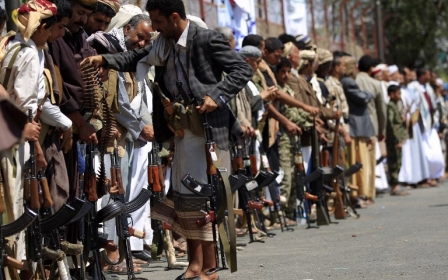Yemeni separatists vacate key government buildings in Aden

Yemen’'s southern separatists withdrew on Saturday from key government buildings in Aden they had seized last week, but held on to military camps that give them control over the southern port that is the interim seat of Yemen's ousted Saudi-backed government.
A western-backed, Saudi-led coalition intervened in Yemen in March 2015 to try to restore the internationally recognised government of Abd Rabbu Mansour Hadi after the Houthis ousted him from power in the capital Sanaa in late 2014.
The separatists are a main component in the anti-Houthi alliance, but the war has rekindled old tensions. South Yemen was an independent country until it merged with the north in 1990. An armed secession bid four years later ended in occupation by northern forces, giving rise to resentments that persist to this day.
The supporters of the separatist Southern Transitional Council (STC) pulled out of the headquarters of Hadi's government, the supreme court and the central bank as well as Aden's main hospital, Hadi's information minister, Muammar al-Iryani, said on Twitter, AFP reported.
Stay informed with MEE's newsletters
Sign up to get the latest alerts, insights and analysis, starting with Turkey Unpacked
Iryani said preparations were also underway for a pullout by the fighters - trained by the United Arab Emirates - from the interior ministry and the Aden oil refinery.
Hadi's government has refused to enter talks with the separatists until they withdraw from the positions they seized in deadly fighting last week.
The UAE is Saudi Arabia's main partner in the coalition, but it trained and equipped the separatists as part of its efforts to consolidate control of the south.
The separatist fighters last week ousted unionist troops loyal to Hadi from what was the capital of the formerly independent south in clashes that left about 40 people dead.
The Saudi-led coalition condemned the takeover of the city and urged the separatists to withdraw to clear the way for peace talks.
On Thursday, a joint Saudi-UAE military delegation travelled to Aden to discuss the details of a separatist pullback.
On Saturday, AFP journalists saw Saudi and Emirati military vehicles deployed around the positions vacated by the separatists. The presidential palace was also placed under Saudi and Emirati protection, they said.
The coalition said in a statement on Saturday that the positions occupied in Aden would be handed over to the government under coalition supervision.
The coalition also called on all forces "to unite in order to foil Iran's destructive plan in Yemen" and prevent attacks by militant factions including al-Qaeda and the Islamic State group.
Saudi Arabia and the UAE have repeatedly accused Iran of supplying weapons, including ballistic missiles, to the Houthi rebels, an accusation Tehran has consistently denied.
The UN has been trying to implement a stalled peace deal in the port city of Hodeidah and pave the way for political talks to end the war, which has pushed Yemen to the brink of famine.
Houthi leader Abdel-Malek al-Houthi said that events in Aden showed the coalition was in crisis and that Hadi was powerless, Reuters reported.
"Those who supported the aggressors ... have no authority or freedom, but are subservient to Saudi Arabia and the United Arab Emirates," the group's Al Masirah TV quoted him as saying.
Meanwhile, the Yemeni embassy in Washington earlier this week tweeted a foreign ministry statement welcoming the Saudi initiative to address the "coup" in Aden.
It said the separatists "must first commit to total withdrawal from areas forcibly seized” in past few days before the start of any talks.
Coalition warplanes fired flares over Aden at dawn near the camps occupied by separatist fighters after the alliance renewed a call for them to quit government sites and for all forces in the south to focus on fighting the Houthis.
The STC has accepted the call for peace talks.
Analysts say the break between Hadi's government and the separatists reflects a wider rift between Riyadh and Abu Dhabi that threatens to undermine their common battle against the Houthis.
The UAE has called for dialogue without directly asking the southern forces to cede control. Saudi Arabia wants to host a summit to end the crisis. Hadi's government says it will not attend before separatists reverse what it calls their "coup".
Despite almost five years of military intervention by the coalition, the Houthi rebels remain in control of the capital Sanaa and much of the more populous north.
The rebels have also carried out a spate of cross-border missile and drone attacks targeting Saudi oil fields, airbases and other facilities in recent months in what it says is retaliation for the Saudi-led air war in Yemen.
Middle East Eye delivers independent and unrivalled coverage and analysis of the Middle East, North Africa and beyond. To learn more about republishing this content and the associated fees, please fill out this form. More about MEE can be found here.






